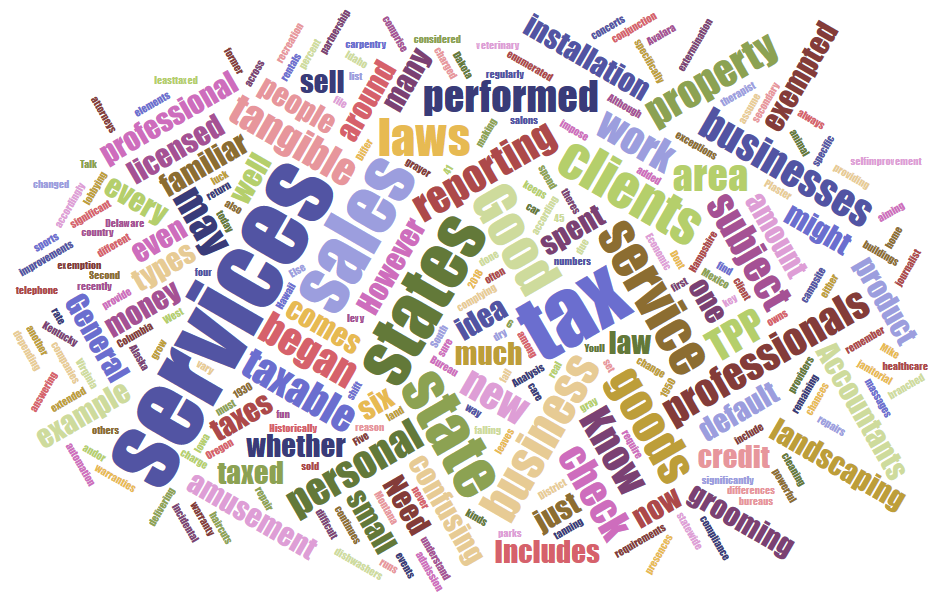Most accountants and tax professionals are familiar with sales tax reporting and complying on goods, but what about services? It’s a much grayer area when it comes to sales tax for services – and often confusing for your clients.
Historically, most states exempted services from sales tax – for a good reason: When states first began to levy these taxes around 1930, people spent more of their money on tangible goods. However, according to the Bureau of Economic Analysis, those numbers began to shift significantly around 1950, and even today, the amount people spend on goods keeps falling, while the amount of money spent on services continues to grow.
Laws Differ from State to State
How will clients know whether their service is subject to sales tax? Laws vary, so it’s a good idea to check in every state where they do business.
Five U.S. states (New Hampshire, Oregon, Montana, Alaska and Delaware) do not impose any general, statewide sales tax on goods or services. Of the 45 states remaining, four (Hawaii, South Dakota, New Mexico and West Virginia) tax services by default, with exceptions only for services specifically exempted in the law.
This leaves 41 states — and the District of Columbia — where services are not taxed by default, but those enumerated by the state may be taxed. Again, it’s confusing; every one of these states taxes a different set of services, making it difficult for service businesses to understand which states’ laws require them to file a return, as well as which specific elements of their services are taxable. For example, dry cleaning and haircuts are subject to sales tax in Iowa, but not in Idaho.
Second, laws change. Don’t assume there will be an “exemption” just because a client never charged any tax on its services. For example, a new law in Kentucky recently added veterinary care, landscaping work and campsite rentals to the list of service providers that must charge a 6 percent sales tax.
Six General Types of Taxable Services
Some of these six may be familiar and others not so much; either way, chances are good you have one or more clients providing services that need to know more about these requirements; remember, again, there are significant differences across the country, so be sure to check each state accordingly.
- Services to tangible personal property (TPP): Many states now tax services to TPP at the same rate as sales of TPP. This includes improvements or carpentry repairs to property, and car repair.
- Services to real property: Includes work done on buildings and land, such as landscaping or janitorial services.
- Business services: Here, services performed for businesses and companies include telephone answering, credit reporting and credit bureaus, and extermination services.
- Personal services: These comprise businesses that provide personal grooming or other types of self-improvement, tanning salons, massages not performed by a licensed therapist, and even animal grooming.
- Professional services: These are considered the least-taxed services due to powerful lobbying presences. Accountants fall into this area, as well as the work performed by attorneys and healthcare professionals, among other licensed professionals.
- Amusement and recreation: Where there’s fun, there may be a tax on services; many states tax admission to amusement parks and events such as concerts and professional sports.
What Else You’ll Need to Know
Talk about another gray area! If you have clients that sell dishwashers, and also sell installation services and extended warranties, depending on the state, the installation and warranty might be subject to sales tax. However, if a service is sold in conjunction with a tangible product, but the product is secondary or incidental, the service might not be taxable at all.
Although automation is key when it comes to sales tax reporting and compliance, it’s always a good idea to regularly check in with your clients to find out if they changed the kinds of services they are delivering and/or whether they branched out to more than just their home state. Good luck.
———-
Mike Plaster is a former journalist who now owns and runs a small business. He began a partnership with Avalara in 2018, aiming to shed light on issues important to small business owners and Amazon sellers.
Thanks for reading CPA Practice Advisor!
Subscribe Already registered? Log In
Need more information? Read the FAQs





